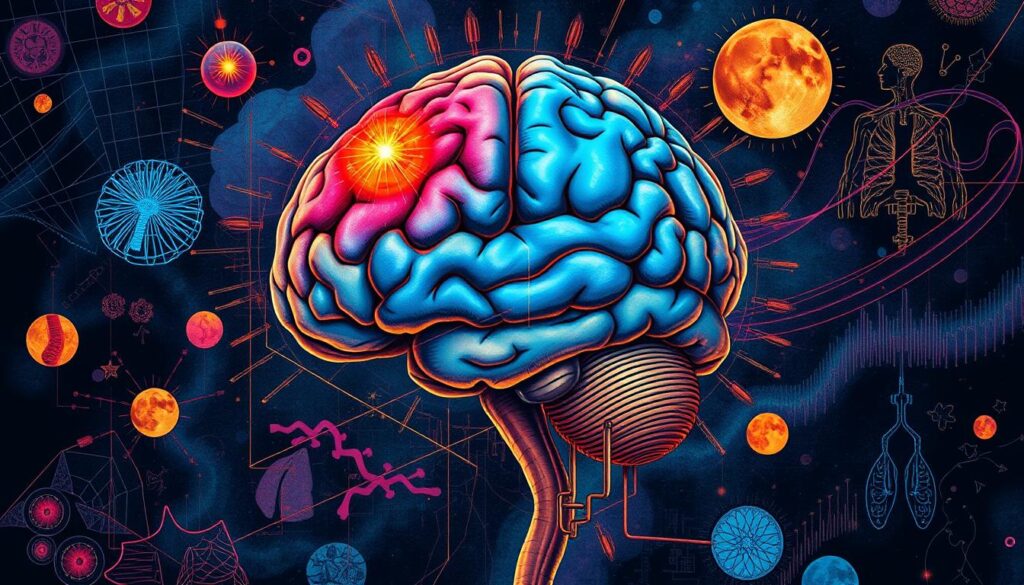Do you often feel drained, even after a full night’s rest? Have you observed a link between your stress and sleep quality? You’re not the only one. The connection between obstructive sleep apnea (OSA) and stress is essential for enhancing your health and well-being.
Sleep apnea, a prevalent sleep disorder marked by pauses in breathing during sleep, significantly affects stress levels. On the flip side, stress can make worse sleep apnea symptoms, creating a cycle that may be hard to escape. Stress significantly impacts our sleep quality, often leading to sleep disorders such as obstructive sleep apnea to say the least. It disrupts the body’s natural sleep cycle, raises physiological arousal, and hampers falling and staying asleep.
Key Takeaways
- Obstructive sleep apnea (OSA) and stress are closely intertwined, with each condition influencing the other.
- Stress can contribute to the development and progression of sleep apnea, while sleep apnea can exacerbate stress-related disorders.
- Understanding the link between sleep apnea and stress is crucial for improving overall health and well-being.
- Effective stress management techniques can play a vital role in improving sleep apnea outcomes.
The Link Between Sleep Apnea and Stress
Stress and Sleep Health
Stress directly affects the respiratory system, increasing the risk of upper airway obstruction and OSA. It worsens sleep apnea symptoms by boosting inflammation, altering hormone levels, and activating the stress response. Stress hormones like cortisol and heightened sympathetic nervous system activity worsen upper airway obstruction, disrupt breathing, and increase apnea and hypopnea episodes during sleep.
This cycle worsens sleep quality and daytime functioning, perpetuating a cycle between stress and sleep apnea.
| Statistic | Value |
|---|---|
| Individuals dealing with high levels of stress are 2.8 times more likely to develop sleep apnea symptoms compared to those with lower stress levels | 2.8 times more likely |
| Around 70% of patients diagnosed with sleep apnea report experiencing stress as a significant contributing factor to their sleep disorder | 70% |
| Over 25% of individuals with untreated sleep apnea experience worsening symptoms due to stress-related factors | Over 25% |
| Approximately 60% of individuals with sleep apnea also report struggling with stress, anxiety, or other mental health issues | 60% |
These statistics underscore the strong connection between stress and sleep apnea.
Sleep apnea increases oxidative stress, inflammation, and disrupts the HPA axis, which controls stress. It can then elevate stress hormones, alter the immune system, and raises the risk of heart disease and metabolic disorders.
This interplay creates a complex feedback loop, making both conditions worse. For example, sleep apnea can increase stress, which worsens sleep apnea symptoms. This cycle can affect someone long term leading to insomnia and chromic stress.
Research shows men are 2 to 3 times more likely to have obstructive sleep apnea (OSA) than women. Smokers are three times more likely to have OSA than non-smokers. Middle-aged and older individuals face a higher risk of central sleep apnea. Opioid medicines, especially long-acting ones like methadone, also increase the risk of central sleep apnea.
Sleep apnea and stress: Psychological Consequences
The relationship between sleep apnea and stress goes beyond physical health, deeply affecting mental well-being. Those with sleep apnea often face higher rates of depression and anxiety. These conditions can make sleep worse as you stay awake at night.
Depression, Anxiety, and Sleep Apnea
Research links sleep apnea to a higher chance of mental health problems, with anxiety being the most prevalent. Untreated sleep apnea can lead to severe psychological distress, even suicidal thoughts. Moreover, mental health conditions before sleep apnea diagnosis can increase the risk of developing it, making the situation complex and alarming.
Brain Changes Associated with Sleep Apnea and Stress
Studies show that OSA leads to reduced gray matter and white matter disruptions in the brain. These changes affect cognitive and psychological health. For example, less gray matter in the hippocampus, crucial for memory and learning, may cause cognitive issues in OSA patients.
Moreover, white matter tracts, which connect brain regions, become less functional. This can make it hard to manage emotions, perform executive tasks, and process information. It worsens the effects of OSA on overall well-being.
| Brain Region | Structural Changes in OSA | Functional Implications |
|---|---|---|
| Hippocampus | Reduced gray matter volume | Impaired memory and learning |
| White matter tracts | Disrupted integrity | Impaired brain connectivity and cognitive processing |
| Prefrontal cortex | Decreased gray matter | Impaired executive function and emotional regulation |

Diagnosing and Measuring
Accurate diagnosis and measurement of sleep apnea and stress are essential for effective treatment. It is diagnosed through polysomnography, which monitors breathing patterns, oxygen levels, and sleep stages overnight. Stress is assessed with self-report measures like the Perceived Stress Scale (PSS) and the Generalized Anxiety Disorder-7 (GAD-7) questionnaire. Objective measures, such as salivary cortisol levels, also provide insights into stress response. These tools help healthcare providers understand the relationship between sleep apnea and stress.
Sleep studies, or polysomnograms (PSG), are the primary method for diagnosing sleep apnea. During a PSG, patients are monitored overnight in a sleep laboratory. This process records various physiological parameters, including:
- Breathing patterns
- Oxygen levels
- Sleep stages
- Brain activity
- Eye movements
- Muscle activity
This data aids healthcare providers in determining sleep apnea severity and creating treatment plans. Sometimes, at-home sleep apnea testing with portable devices is an option, offering convenience over laboratory studies if you are not able to make it in for testing.
Stress levels are assessed using self-report measures like the Perceived Stress Scale (PSS) and the Generalized Anxiety Disorder-7 (GAD-7) questionnaire. These tools capture an individual’s subjective stress and anxiety levels such as salivary cortisol levels and also reveal physiological stress responses to look into. By combining these methods, healthcare providers can comprehensively understand the relationship between sleep apnea and stress. This knowledge enables them to develop more effective treatment strategies.
| Diagnostic Tool | Measure | Purpose |
|---|---|---|
| Polysomnography (PSG) | Breathing patterns, oxygen levels, sleep stages | Diagnose and assess the severity of sleep apnea |
| Perceived Stress Scale (PSS) | Self-reported stress levels | Measure subjective experience of stress |
| Generalized Anxiety Disorder-7 (GAD-7) | Self-reported anxiety symptoms | Assess the presence and severity of anxiety |
| Salivary cortisol | Physiological stress response | Provide objective measure of stress levels |
By combining these diagnostic tools, healthcare providers can gain a deep understanding of the complex relationship between sleep apnea and stress. This leads to more effective treatment strategies and better patient outcomes.
Managing Stress for Better Sleep Apnea Outcomes
Effectively managing stress is key to enhancing sleep apnea outcomes. Stress management techniques have proven effective in reducing stress and improving sleep quality. This, in turn, boosts the effectiveness of the treatment.
Stress Management Techniques
Relaxation techniques like deep breathing, meditation, and yoga are highly effective. Regular meditation practice lowers cortisol levels, reduces blood pressure, and slows the heart rate. These changes help reduce physiological stress responses, which can improve sleep quality.
Movement is another powerful stress management tool. It releases endorphins, serotonin, and other neurotransmitters that elevate mood and promote relaxation. Regular physical activity also enhances cardiovascular health, aids in weight management, and improves overall well-being. These benefits indirectly improve sleep quality and sleep apnea symptoms.
Dealing with mental health issues such as depression and anxiety can disrupt the stress-sleep apnea cycle. Cognitive-behavioral therapy (CBT) has been shown to be effective in reducing stress and enhancing sleep for those with sleep apnea. Find a therapist or a coach that is skilled in areas that may be causing you stress.
Integrating these evidence-based stress management strategies into sleep apnea treatment plans can lead to improved long-term outcomes and better quality of life for patients.

Breaking the Cycle
Studies show that 60% of people with sleep apnea also experience panic attacks, underscoring the profound effect on mental well-being. Furthermore, 20% of those with anxiety are more likely to develop sleep apnea due to anxiety-induced insomnia affecting the respiratory system during sleep.
To end the cycle, a holistic approach is essential. CPAP therapy, the main treatment for sleep apnea, has an 85% success rate in reducing apnea episodes and enhancing sleep quality, thus lowering anxiety tied to poor sleep. Complementary methods, like cognitive-behavioral therapy (CBT), which successfully treats 70% of anxiety-related sleep problems, tackle the psychological facets of sleep apnea and anxiety.
Additionally, lifestyle modifications are crucial. Regular exercise and a balanced diet can cut anxiety symptoms by 40%. Keeping a healthy weight can reduce sleep apnea severity by 60%. These changes significantly aid in managing both conditions.
By tackling the root causes of the sleep apnea and stress cycle, individuals can regain control over their health. This leads to improved outcomes for both conditions.
Next Steps
Take this health assessment and see where you are currently at on your journey:
Take Your Wellness Assessment: Health & Sleep Checklist
Stay Connected and Enhance Your Well-Bing
- Free Training: Realign Your Wellness
- Join Our Wellness Community: Wellbeing Group on Facebook
- Take Your Wellness Assessment: Health & Sleep Checklist
- Explore More Free Resources: Wellness Resources
- Contact Us: info@clarissabooker.com
- Watch on YouTube: Holistic Wellbeing Vibes
Stay connected with us for tools, resources, and support on your holistic wellness journey!

